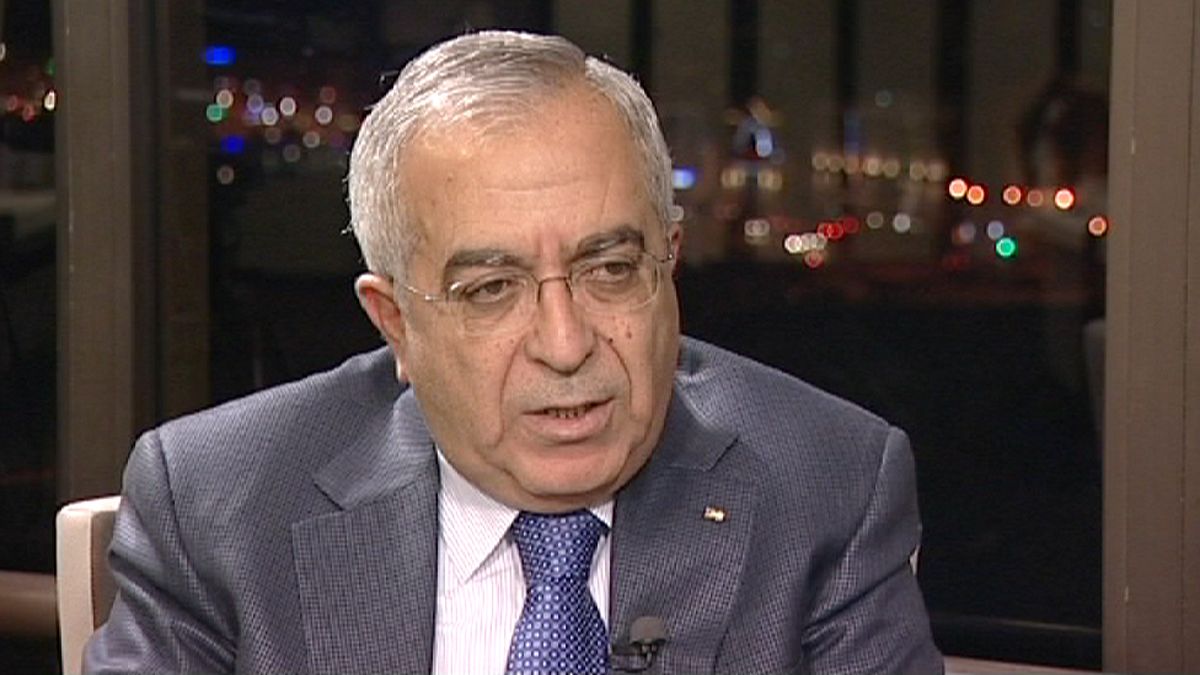Palestinian Prime Minister Salam Fayyad, has been talking to euronews about water and the part it has played in the conflict with Israel.
He was attending the sixth World Water Forum in Marseille. There have been 21 armed disputes over water in recent history and 18 of them involved Israel.
Israel has controlled water supplies in the West Bank and Gaza Strip since it first occupied the areas in 1967.
Mohammed Shaikhibrahim, euronews: “You are here to participate in the World Water Congress, what are the most pressing problems with regard to the provision of water in Palestine?”
Salam Fayyad: “Water scarcity. Certainly, we are facing water poverty at a high level. It is clear the lack of equal distribution confirms the occupation and favours Israel and settlers. This implies prejudice against the Palestinian people; in general the region as a whole is facing water poverty and it affects us badly, particularly in the Gaza Strip and West Bank.
“I am here because an important project will be announced during the conference by the French government and the French prime minister who is to unveil this vital, strategic water project for water desalination in the Gaza Strip.
“In general in the occupied Palestinian territories water for consumption is less than the minimum acceptable and approved by the World Health Organisation. That’s about 70 litres per capita per day in Palestine, compared to 100 litres according to the WHO criteria, so it is less than the minimum approved by WHO and compared to Israel, well they get three times that amount.
“In the settlements there is a big difference between the settlers and Palestinians especially in the Jordan Valley, the proportion of water available to the settlers is about 18 times more than the Palestinians get.”
euronews: “You are blaming the Israelis as they control most water sources in the Palestinian territories, but the Oslo agreement, specifically Article 40, gave legitimacy to the Israelis to control most sources of water. Here we are back again today to talk about the same problem. Is there a contradiction in attitudes from the Palestinian leaders?”
Salam Fayyad: “The Oslo agreement does not give the right for the Israelis to use water in this unfair way, and when we talk about the areas of shared water sources, we can say they don’t have the right to exploit 90 percent of the shared sources for the benefit of Israel, and if this was the case, we would not be here to discuss this matter now. We consider this attitude as part of the command and control relating to the Israeli occupation.
“In 2011, Israel destroyed about 46 water utilities in the West Bank. For example, they annihilated wells collecting water which dated back to Roman times. In addition Israel does not allow us – in the Palestinian National Authority – to dig water wells until we obtain licenses authorised by them.
“So I would like to know how Oslo allowed them to do this, how come Oslo allowed the Israeli occupation to sabotage the wells?”
euronews: “What are the main economic problems that the Palestinian National Authority is facing these days?”
Salam Fayyad: “The Palestinian national economy works below production capacity, thus it is difficult to create jobs. The situation would be better if there was no Israeli political control and occupation. The contact between Palestine and the rest of the world is restricted by the procedures of the occupation. Our authority does not control the borders, does not it control the crossing points and communication with the outside world, everything is controlled by Israel through the control system and the arbitrary use of all forms of abuse, which limits our ability to reach full production capacity. The only solution is to end the occupation.”
euronews: “You have declared more than once that the PA is close to the establishment of a Palestinian state. You have even set a timetable for the establishment of the state, how are you going to achieve this?”
Salam Fayyad: “Preparedness and readiness for establishing the state are different from a state itself, that is another matter. The concept of an independent state with full sovereignty over the entire land occupied since 1967 in the Gaza Strip and the West Bank and East Jerusalem, of course, requires ending the Israeli occupation. What we declared is the readiness and this is witnessed by the international community about a year ago.”
euronews: “Do you mean you are now ready to establish a Palestinian state?”
Salam Fayyad: “This has been confirmed by reports from international institutions, the World Bank, the International Monetary Fund and the United Nations. Those reports examined our institutions and the Palestinian National Authority and assessed their ability to provide services in different areas to reach the main goal.”
euronews: “The Palestinian National Authority has no control over most of the Palestinian territories, including liberated Palestinian towns. There is no full sovereignty over the city through what we see, like ongoing violations by the Israelis. At the same time the negotiations are at a standstill as you say, is the Palestinian leadership thinking of dissolving the PA as an option?”
Salam Fayyad: “There is no talk of dissolving the PA at all, the PA is basically a phased transition, until we reach or achieve our goal which is the state. The PA is not philanthropic, its the result of continuing decades of struggle. The PA is considered as a tool of resistance and to enable the Palestinian people to be in a better situation. What’s required is to draw the attention of the international community to this important issue. That the PA is important as a tool for the Palestinians to get back their full rights and to achieve their dream. The PA will achieve it, God willing.”
